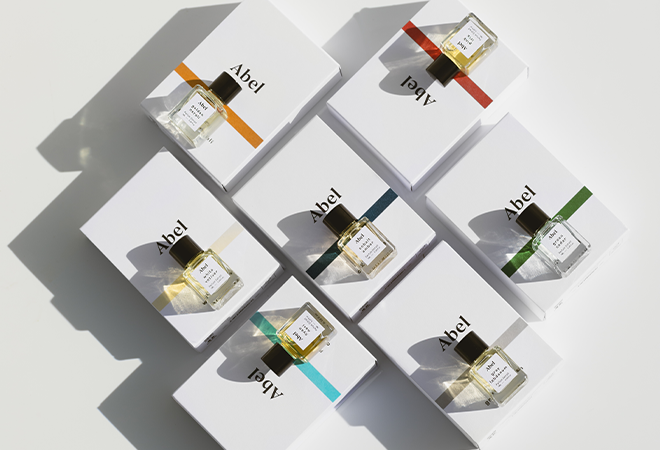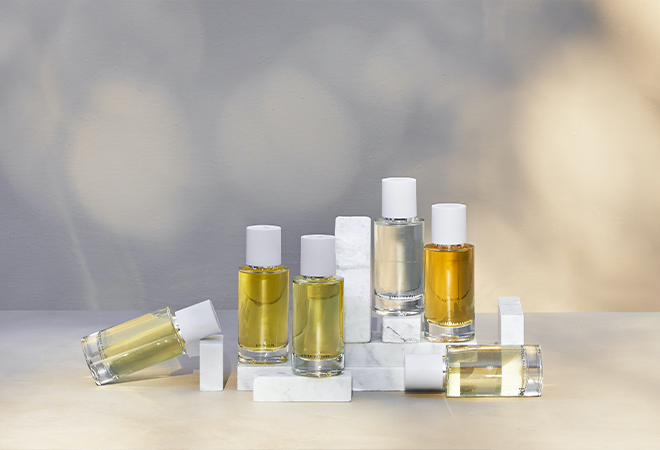Natural fragrances have been in high demand, expected to reach a global market value of $20.8B by 2024. But for creatives like Frances Shoemack, founder of Abel, it’s not just about creating a product devoid of synthetic fragrance notes, but celebrating the full aromatic profile and benefits that Mother Nature has to offer. Whether it’s the essential oils or naturally derived single-aroma compounds and organic alcohol base in the formulas, each ingredient has been chosen with utmost discernment.
Based in New Zealand and with products currently sold in 33 countries, the company began in 2011 in Amsterdam, when Shoemack, a winemaker by trade, struggled to find natural fragrances that suited her taste. Launched in 2013, today Abel has a curated lineup of 100% plant-derived, cruelty-free, and vegan fragrances made with ethically sourced ingredients (a majority of which are courtesy of Symrise), packaged in FSC-compostable and Bakelite packaging, sent to customers with low-carbon shipping. A portion of proceeds go to 1% For The Planet and Mary’s Meals.
Created in collaboration with master perfumer Isaac Sinclair, the newest releases from the brand include Pause, designed to balance the mind and body as it goes through hormonal changes, and Cyan Nori, a scent dedicated to the ocean. Pause is a grounding floral offering notes of violet leaf, narcissus, mimosa, and hay—all chosen for their stabilizing and tranquilizing properties. Cyan Nori offsets plant-derived musk with fruity notes of tangerine and peach, topped off with the scent of salt. While the brand began with eau de parfums, it recently released a line of alcohol-free extraits, containing therapeutic-grade essential oils with a 25% concentration.
In a true embodiment of the principle of “kill your darlings,” for every new release into the Abel portfolio, one product is discontinued in a bid to counteract excessive consumerism. The company also discloses all ingredients in its formulations, rather than keeping certain ingredients under the “parfum” label, and is currently petitioning for wider disclosure of ingredients across the entire perfume industry, encouraging its customers to take action and campaign for change.
BeautyMatter sat down with Shoemack to discuss the brand’s international DNA, the evolution and prevailing myths of natural perfumery, and Abel’s crusade for increased transparency and ingredient overhaul.
Starting off, what parallels do you draw between winemaking and perfumery?
Both disciplines are really about where science meets art and finding harmony in the olfactory, which is a pretty singular similarity between the two. When it comes to the way we make perfume at Abel, we’re even further informed by my experience in the wine industry, including the way we bring the ingredients to the fore. In wine, you say you can’t make a good wine with bad grapes, and in perfume, it’s exactly the same. The incredible natural ingredients are what make our fragrances so special, complex, and enduring.
How did spending time between New Zealand and Amsterdam inform your perfumery practice?
Abel’s lucky to have both these incredible places in its DNA. Growing up in New Zealand surrounded by nature has informed my own experiences and palette, as well as that of our master perfumer Isaac Sinclair. Likewise, for both of us, later life experiences living in European global hubs (Paris and Milan for him, Amsterdam for me) have informed the urban aesthetic of the brand.
How would you describe the working partnership with Isaac when it comes to fragrance creation?
Extremely collaborative! Normally Isaac and I sit together in the lab in Paris in the early days of the fragrance development and really firm up the creative concept between the two of us. We go on in this way, with very little involvement from the outside world. It’s an awesome working partnership.
What are the challenges of creating an ethical and sustainable supply chain?
If you’re trying to be truly conscious, there are no black-and-white answers. For example, glass is endlessly recyclable, but also heavy (for shipping). Weighing the pros and cons and making decisions based on your brand values is important. I’m always skeptical when I hear brands with sweeping sustainability statements or making it sound simple—it’s not, sustainability is very nuanced. At Abel, we combat that by being very open and transparent with our customers so that even if hindsight proves a decision wasn’t the best, we can show why that decision was made. Basically, we’re trying our hardest and bringing our customers along for the journey.
What are your thoughts on the evolution of the natural perfume category and the rise of clean fragrance?
I’m thrilled to see a natural perfume category beginning to emerge. When I started Abel almost a decade ago, I felt at the time that perfume was really lagging behind other sectors in terms of what is often referred to as “clean.”It took several more years since then for the category to really start to emerge. Like any emerging industry, there’s a bit of ironing out to do around what’s important, or what different terms mean. The great thing is that consumers are ahead of the game, demanding transparency, getting in behind brands doing the right thing, and the industry is aware things can’t continue the way they have done—relying on petrochemicals.


How is customer engagement with the eau de parfums versus the newly launched extraits?
The pandemic changed the way customers were interacting with their perfume. It became less about what you’re wearing for others and more about how that scent made you feel. The parfum extrait line was our response to this change—what would happen if we led with the therapeutic value first, fine fragrance second. The extraits have been super well received and exceeded our initial expectations.
Have there been any challenges regarding retail and distribution given that natural perfumery is still a niche category in comparison to the rest of the fragrance industry?
We never want to use scare tactics in talking about our perfume—our brand messaging is always super positive. We want you to fall in love with our fragrances, we want the natural ingredients to make you feel amazing. So a challenge for us has been figuring out how we can educate our retailers and store staff, while not relying on any of these scare tactics often associated with selling the fear, or ostracizing ourselves in a conventional environment.
Often the consumer assumption is that natural fragrances don’t last as long or have as many layers of depth as their counterparts containing synthetics. What myths around natural perfumery would you like to dispel?
Not only are they the most rare and expensive ingredients, natural ingredients are the most complex and beautiful in a perfumer's palette. Ask any master perfumer what ingredients get them excited, and I almost guarantee they’ll be naturals. Regarding longevity, it’s true, 100% natural fragrances won’t last as long as their synthetic counterparts. We work tirelessly in the development process and with the latest natural science to ensure our perfumes are long-lasting—and most people are surprised at how long they last! But we don’t try to make them last forever. It’s a bit like the McDonald's hamburger that never breaks down analogy. If a perfume stays forever on your skin and clothes, chances are it’s also not breaking down in our ecosystem. I guess the myth here is that longevity equals quality, and that’s just not true.
Your “one in, one out” policy to fragrance launches is a refreshing antidote in a world of constant production and consumption. As a creative, do you find this self-imposed restriction challenging or a benefit to your process? How did your customers react to it?
There’s nothing like restrictions to breed creativity! We’ve found that our creative process is getting stronger all the time, and our access to new biotech and natural science is constantly increasing too. By putting in place the “one in, one out” policy, we’re stopping ourselves from launching something mediocre, but we’re also ensuring we outdo ourselves, constantly improving with every new scent released. Our customers respond really well to it, and while some are upset if we discontinue their favorite (I find it heartbreaking too!), they also understand and respect the logic, meaning they come on board for the journey.
In a previous interview you mentioned, "We stopped working with only organically certified ingredients when we realized it was holding us back from making the best natural perfume possible.” Could you elaborate on this decision?
A conventional perfumer’s palette of ingredients is around 4,000, a natural perfumer’s palette around 400, and when it comes to organically certified ingredients, that drops right down to about 40! So, working with only organically certified ingredients, we were really limiting ourselves to the styles of perfumes we could make. Organic certifications can be difficult and expensive for a lot of small producers, making it out of reach—especially those in remote areas (for example our wild-harvested Atlas Mountain cedarwood). Other ingredients that are a wonderful sustainable option are byproducts of other industries, therefore not organically certified either e.g.,. our Texan Cedarwood, a by-product of the paper industry). Organic also excludes any biotech ingredients—things like the plant-derived musk we use that really pushes our fragrances ahead. Our rule is every ingredient starts its life as a plant, which is a hard line in the sand.
You are currently campaigning for more transparency around the “parfum" label on the ingredients list with three new labeling requirements. What makes it imperative to disclose all the fragrance ingredients to the public and what feedback (both positive and negative) have you received?
Just like with food or skincare/beauty products, we believe you deserve to know what ingredients are in your perfume. Laws that were developed decades ago to “protect” trade secrets have no place in the 2020s, where consumers are educated and want to know what’s in their products—where the ingredients have come from and what their lifecycle looks like. The general response from people is “Really, that’s crazy that perfume doesn’t come with an ingredients list.” Again, it’s an education thing.
What are your plans with Abel for the future?
We have a lot of really exciting R&D in the pipeline. Most of our plans are centered around the impact natural scent can have in making our customers' lives better. Connecting our customers to the beauty of nature in their day-to-day life.